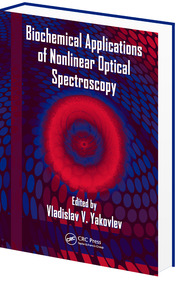Biochemical Applications of Nonlinear Optical Spectroscopy

For a host of reasons, nonlinear optical spectroscopy is a valuable tool for
biochemical applications where minimally invasive diagnostics is desired. Biochemical
Applications of Nonlinear Optical Spectroscopy presents the latest technological
advances and offers a perspective on future directions in this important field.
Written by an international panel of experts, this volume begins with a comparison
of nonlinear optical spectroscopy and x-ray crystallography. The text examines
the use of multiphoton fluorescence to study chemical phenomena in the skin,
the use of nonlinear optics to enhance traditional optical spectroscopy, and
the multimodal approach, which incorporates several spectroscopic techniques
in one instrument. Later chapters explore Raman microscopy, third-harmonic generation
microscopy, and non-linear Raman microspectroscopy. The text explores the promise
of beam shaping and the use of broadband laser pulse generated through continuum
generation and an optical pulse shaper.
Lastly, the book discusses the effects of spatial beam shaping on the generated
nonlinear Raman signals in a tightly focused geometry and provides insight into
the extension of nonlinear optical spectroscopy to the nanoscale through the
use of plasmonic tip-enhanced arrangement. With novel experimental approaches
to this technology expanding day-by-day, the book's balanced coverage
from a wide range of international contributors not only elucidates important
achievements, but also outlines future directions in this dynamic and promising
field.
Click here for further information
Terms
While we only use edited and approved content for Azthena
answers, it may on occasions provide incorrect responses.
Please confirm any data provided with the related suppliers or
authors. We do not provide medical advice, if you search for
medical information you must always consult a medical
professional before acting on any information provided.
Your questions, but not your email details will be shared with
OpenAI and retained for 30 days in accordance with their
privacy principles.
Please do not ask questions that use sensitive or confidential
information.
Read the full Terms & Conditions.